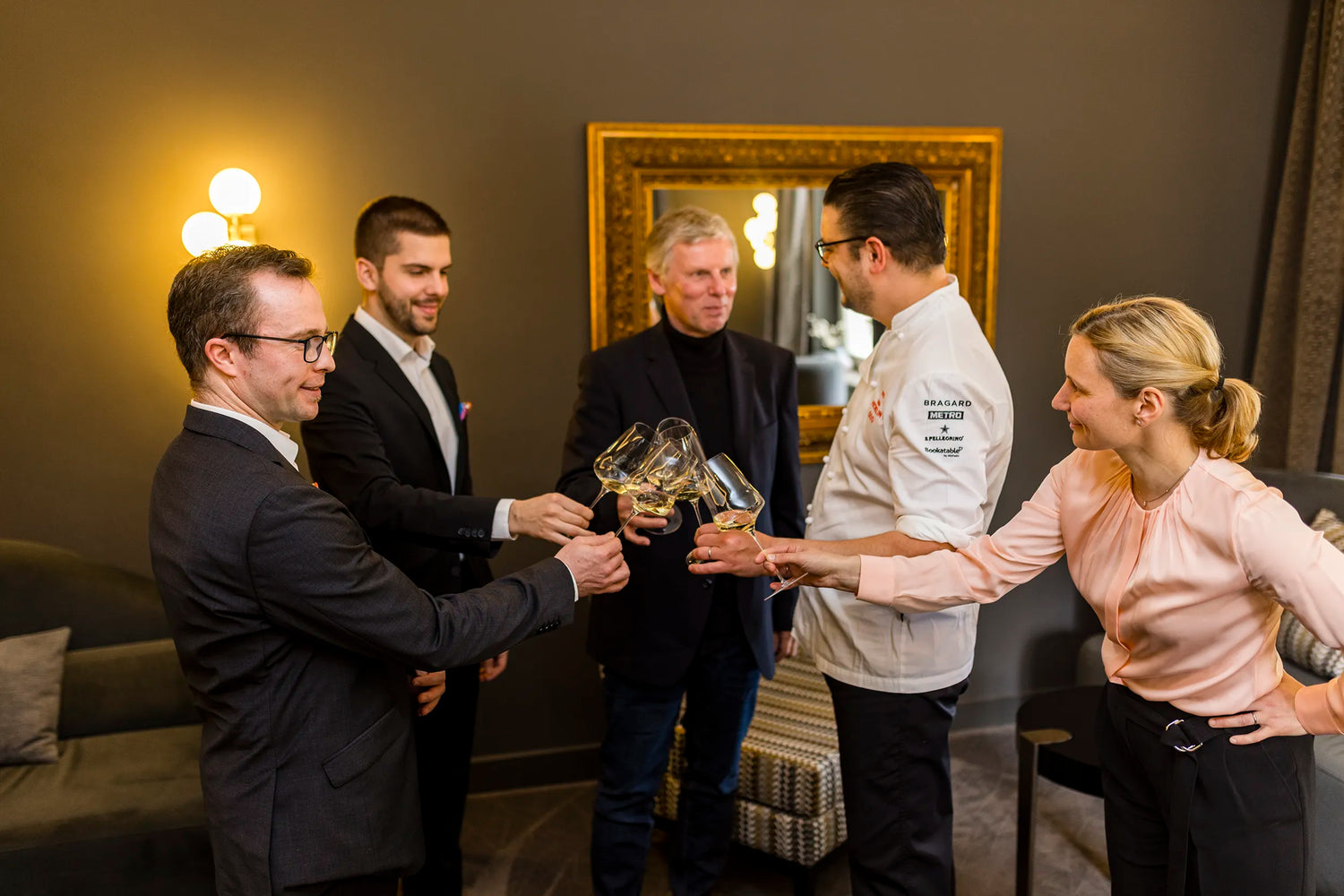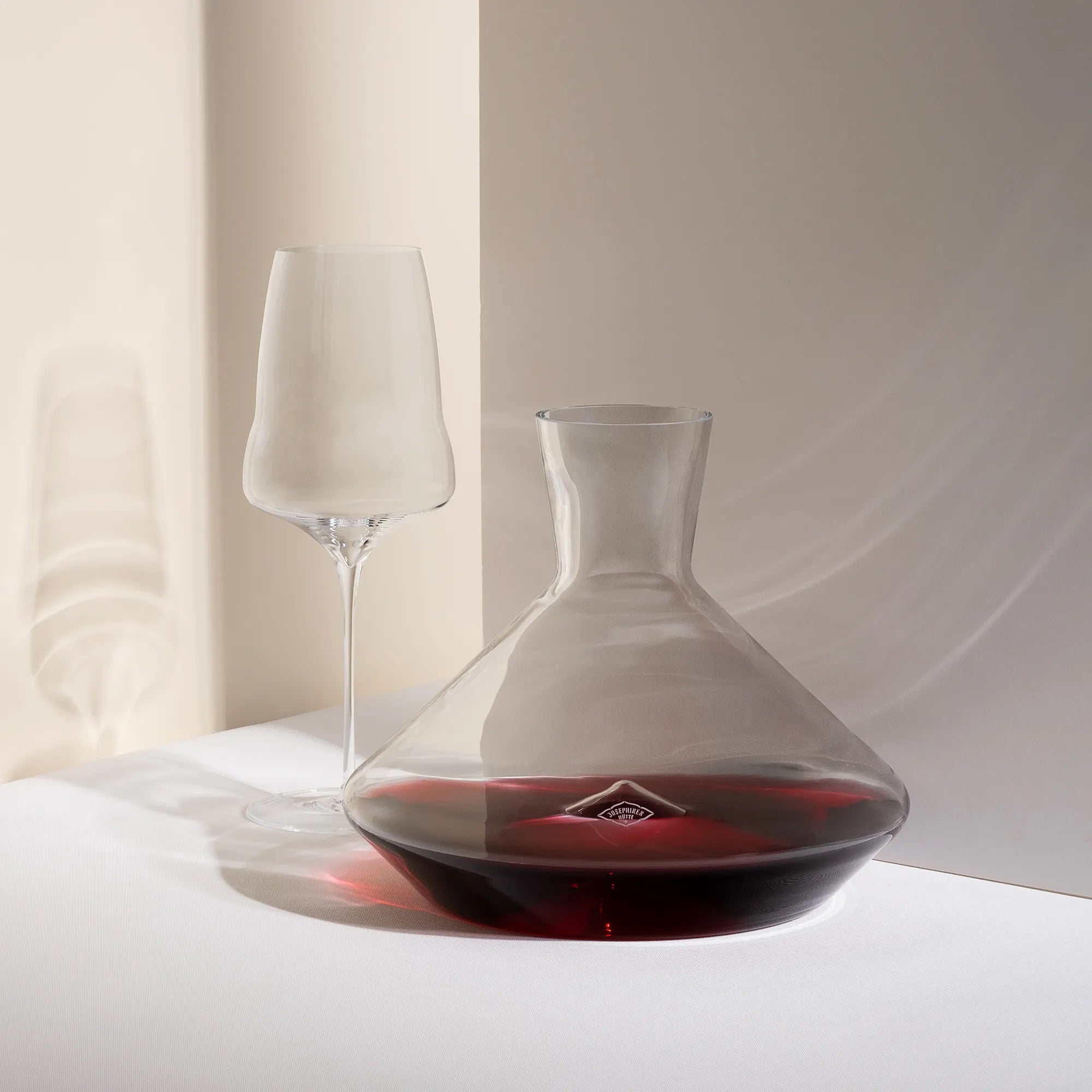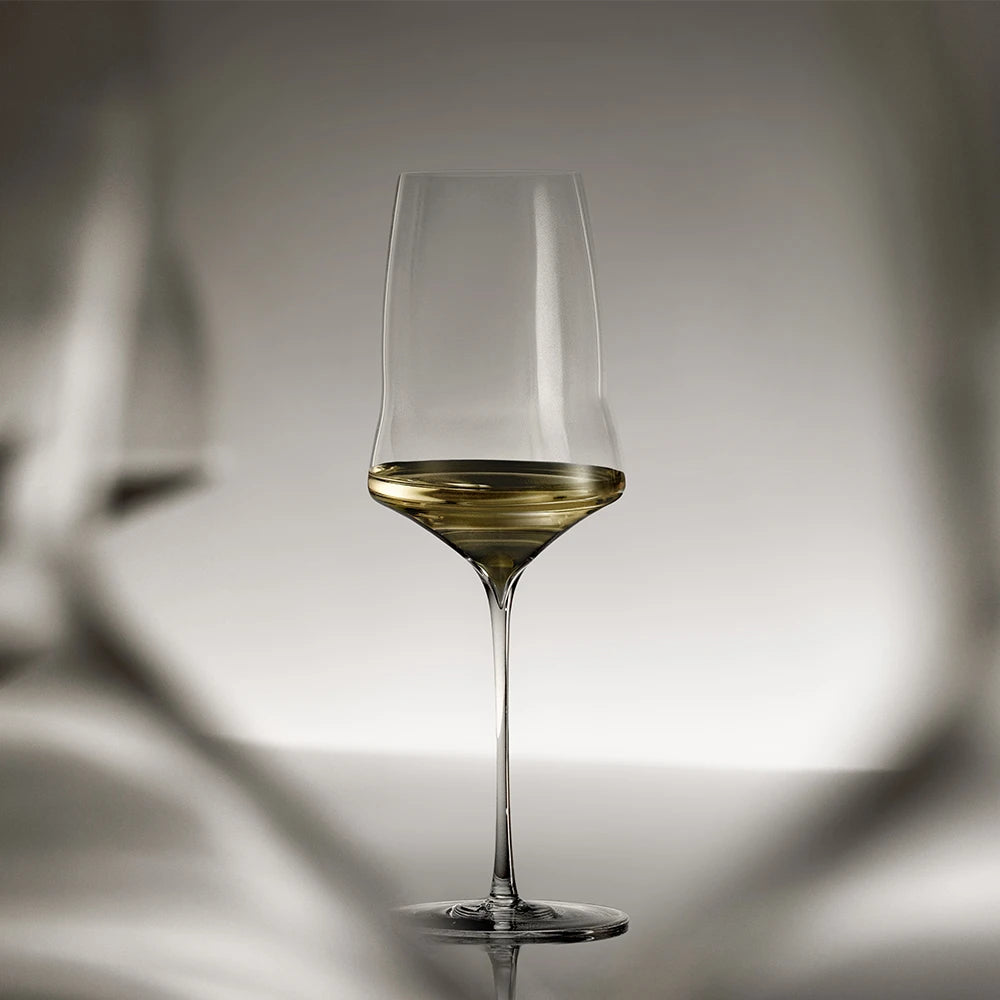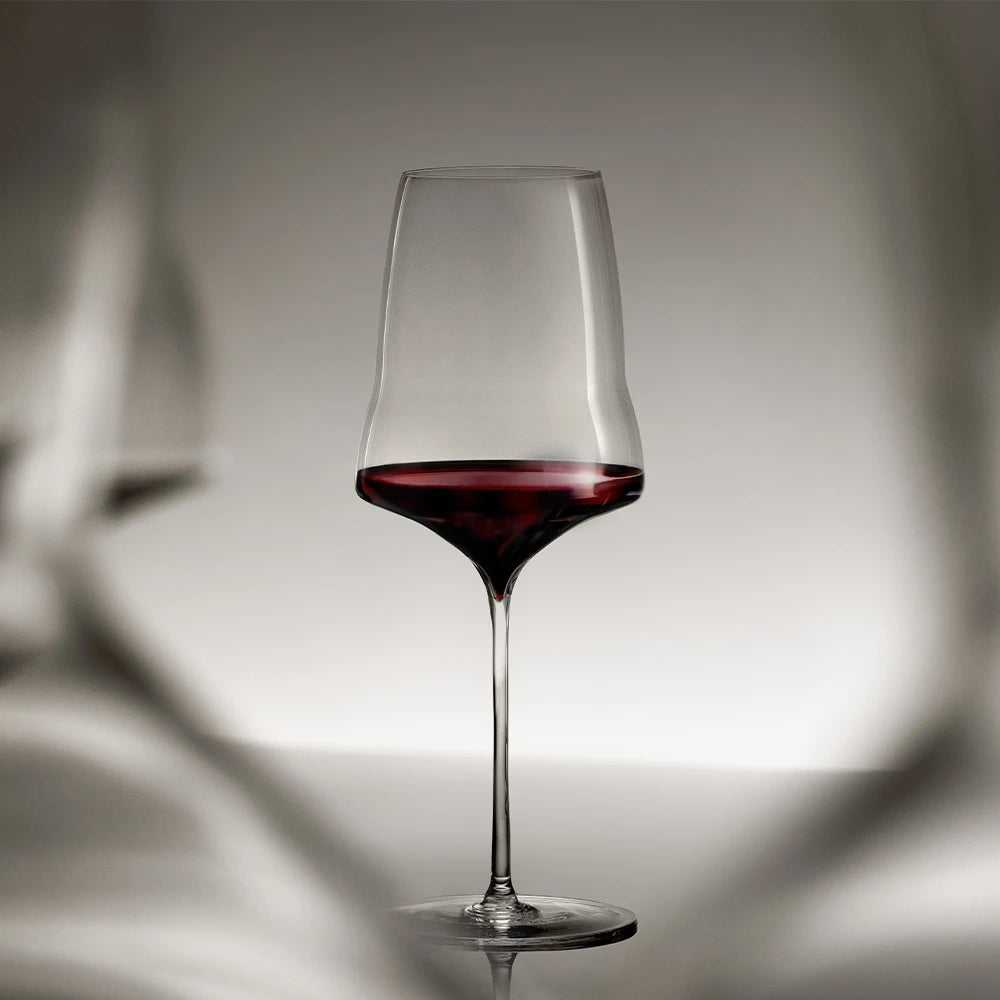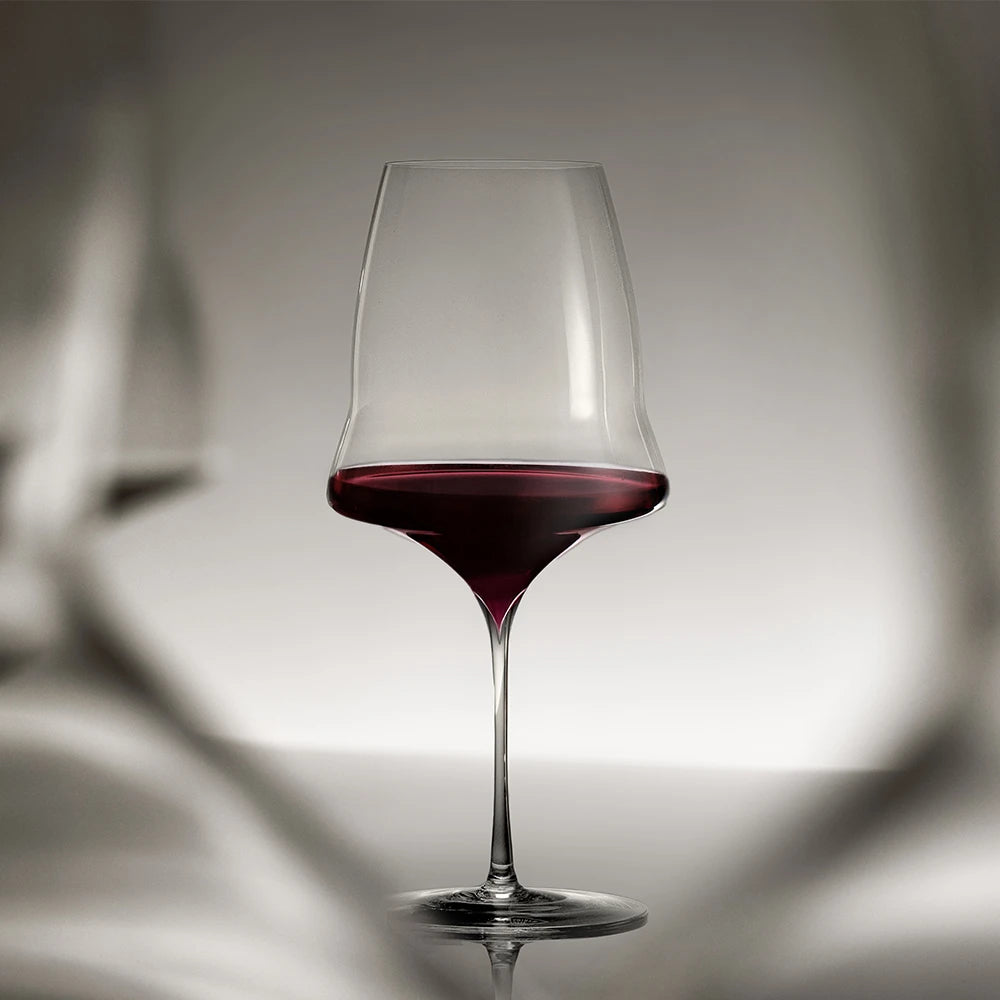The charming Waldhotel Sonnora is surrounded by rolling hills and a lovingly landscaped park. The white house in the Rhineland-Palatinate village of Dreis radiates a soothing calm. "Arriving" here means "relaxing and feeling good." We receive a friendly welcome and take a seat in the lounge, which is something like the antechamber to 3-star heaven, the gateway to culinary bliss. For the Waldhotel Sonnora belongs to one of the best chefs in the world: Clemens Rambichler. The Michelin Guide describes him and his wife Magdalena as an "exemplary host couple," and we can only agree. We meet Magdalena Rambichler and her two sommeliers Sebastian Boucher and Oliver Adler to talk about love for gastronomy, passion for the right glasses and the perfect breakfast.

Prologue
"There are places and people that immediately capture you. The Waldhotel Sonnora and the Rambichler family are among them," says Josephinenhütte’s glass designer Kurt Josef Zalto after his visit to Dreis. He has travelled to the hotel especially for the interview, afterwards getting straight back into the car headed in the direction of the Austrian Waldviertel. He has a satisfied smile on his lips. “Meeting great personalities is what makes my work so special. I see the sparkle in the eyes of the people who use our glasses every day, and I feel their enthusiasm. That makes me incredibly proud."
How it all began
Magdalena Rambichler started working at Waldhotel Sonnora three years before her husband. "I had a great relationship with the owner at the time, Helmut Thieltges. I saw Clemens' application on his desk and I liked him," she says with a mischievous smile. "At the time, I jokingly said to Helmut Thieltges 'Whether he can cook or not, please hire him.' And what can I say: my nose was good. Today we are happily married!" The woman knows what she wants. You can tell that right away. While Clemens Rambichler takes care of the kitchen completely, she is responsible for everything else in the house. "As hostess, I'm the ‘gal Friday’ to help out wherever there’s a problem. By the way, right now our most important customer is three and a half. Being a parent definitely can't be neglected.”

Big footsteps to follow
Helmut Thieltges died in 2017 at the age of only 61. The gourmet food world was shocked, and those in his inner circle were in deep mourning. For his wife Ulrike, however, it was clear from the beginning that continuing was what he would have wanted. Magdalena and Clemens Rambichler fulfilled this wish exactly. They have continued. Of course, it took a few operational changes in the beginning to be able to handle the workload without Helmut Thieltges. "At first, we only offered menus and scaled down the à la carte business. We also accepted fewer guests. That was a very intense time for all of us. However, our regular guests fully supported it," Magdalena Rambichler recalls. "And Clemens knew exactly what he was doing and what he could do. He worked intensively with Helmut Thieltges for a total of seven years. They could have been father and son because they were very similar. A great symbiosis!"
The kitchen team was so well tuned that it could deliver absolute top performance even in the months following Helmut Thieltges' death. This also convinced the restaurant testers. In the fall of 2017, the Rambichlers traveled to the Michelin star awards ceremony. "We had no idea what to expect," Magdalena Rambichler recalls. "It was a tremendous joy to be able to keep the three stars." Clemens Rambichler is thus one of the very few chefs who have been awarded three stars directly in his first role as head chef. What an achievement!
"Die Zeit" thus views Clemens Rambichler as an "exceptional figure in German gourmet history". Stern, on the other hand, headlines "Star chef Clemens Rambichler doesn't want to be one." That says a lot about the man. The star cult is alien to him. He fully concentrates on his restaurant and his family. The Rambichler family is also directly passing on their love of gastronomy and good food to the next generation. "Our daughter is already a little gourmet. She loves to eat caviar, mussels and helps us in the patisserie. And when she grows up, she wants to work as a waitress," says Magdalena Rambichler.
Tokyo, New York, Dreis
The restaurant at Waldhotel Sonnora has put the village of 1,500 on the global foodie map. The rural setting fits perfectly with the discreet appearance of the house. It's delightfully unexciting. The Rambichlers put their products, their employees and their guests in the foreground and deliberately take a back seat. Reality more than appearance is what counts here.

Nevertheless, the experience in such a highly distinguished house is an important milestone in the resume of every employee. Oliver Adler made it into the team on his second try. "I thought to myself: Just try it. Take the plunge into the unknown. I wanted to push the envelope," the sommelier says. "At the first interview, I still lacked a bit of experience. I'm very happy that it worked out on the second try. At the time, I was on the verge of changing to the business side when Ms. Rambichler called me. I've been here ever since!"
For sommelier Sebastian Boucher, the leap into the 3-star world was also a real challenge. "When I applied, I wasn't sure if I could do it in terms of knowledge, and I'm glad I made it," he says. "To this day, I haven't regretted the step!"
Magdalena Rambichler makes her personnel decisions very consciously, but in addition to professional skills, her gut feeling plays an important role. The team is relatively small and a spotless resume does not mean that the person is necessarily suitable for Sonnora. When it comes to sommeliers, she finds the choice of personnel perhaps even a bit more difficult. "Precisely because I am a sommelier myself. It just has to be a personal fit," she notes.
The Sonnora experience
Whenever people write about Sonnora, it's about traditional culinary craftsmanship: straightforwardly prepared dishes with precisely brought-out flavors and the finest balance.
"That's true," says Oliver Adler. "We offer exciting feel-good cuisine here. We want to offer a ‘paradise’ experience for our guests. Here we have the best products in the world and plenty of them. We bring classic French cuisine into the present day. Wonderfully light with a multi-faceted play of sweet and sour."
As with our experience, guests are first warmly welcomed. There's a relaxed aperitif in the lounge – perhaps champagne, sherry or a cocktail. Then guests are given the menu and can choose between à la carte or a set menu. Concurrently, the choice of wine is made.
"We start classically with a selection of ‘greetings from the kitchen’," says Sebastian Boucher. "Then we drive by with a lavishly stocked bread cart. Finally, the individual courses are served. We also offer a wonderful selection of cheeses from the classic cheese cart at the end. And there are some sweet treats to accompany the coffee and a digestif."
An important component of a Sonnora menu is the appropriate wine selection. The Michelin Guide explicitly praises the wine accompaniments. "The Grand Cru wine accompaniment is the ultimate. Here we offer top wines with vintage depth. We pour the wines with the Coravin and are generous when it comes to quantity," says Oliver Adler. "If a guest wants to taste a wine after, there is gladly an extra sip, even with rarities. That's important to us!"
"Due to our proximity to the Moselle, France and Luxembourg, this is where our focus lies," adds Sebastian Boucher. "With us, you can also order great wines and rarities by the glass. That is readily accepted."
The wine experience from the glasses was amazing. I absolutely had to have them for the restaurant.
Especially in a 3-star restaurant, it's all about a flawless overall impression. This includes everything from the floral arrangements and table decorations to the tableware and glasses. "We want to present wine in an appropriate setting at Sonnora. For this, we need a glass that does justice to the occasion. We have always worked with a well-known, large glass manufacturer here and were satisfied," says Magdalena Rambichler. "In a tasting with the exceptional winemaker Markus Molitor a few years ago, I came across the glasses from Josephinenhütte. The wine experience from the glasses was amazing. I absolutely had to have them for the restaurant. At first, we took a two-pronged approach. For particularly high-quality wines, we used Josephinenhütte, and for the other wines, we had the standard glass. It quickly became clear that the other glasses simply didn't stand a chance against the JOSEPHINE. That's why we changed over completely."

At Sonnora, Kurt Josef Zalto's glasses often cause a stir because they are so eye-catching. "Questions we are often asked are: Where do the glasses come from? What's the deal with the kink? Is it possible to buy them? Are the four glasses enough for all types of wine? The look polarizes and is often intensively discussed at the tables," reports Oliver Adler. "I like the reduced look with four glasses. It also fits into our reduced ambience. The JOSEPHINE always sets off exciting conversation," adds Sebastian Boucher. "I can imagine that. Our glasses have already helped one or two lame conversations along," Kurt Josef Zalto confirms with a smile.
I like the reduced look with four glasses. It also fits into our reduced ambience. The JOSEPHINE always sets off exciting conversation.
"The JOSEPHINE is beautifully light. That's what guests always notice first. The most important thing for us and our guests is that the JOSEPHINE delivers in terms of taste. It's great to hear guests say that they experience wines they already know in a whole new way in the glasses," says Magdalena Rambichler. "What totally amazed me is that we have significantly less breakage than before, even though the glasses are so delicate. I hadn't expected that."
It's great to hear guests say that they experience wines they already know in a whole new way in the glasses.
This is not the first time Kurt Josef Zalto has heard this. "Mouth-blown glasses are significantly more elastic than machine-made glasses. We also only use selected materials for the glass. In addition, employees are aware that the glass is a precious commodity. It is treated with more respect and care."

The next morning
Most out-of-town guests stay overnight at the Waldhotel Sonnora. After an unforgettable dinner, they retire to one of the hotel's 15 lovingly decorated rooms. The next morning, Clemens Rambichler's kitchen team awaits them for breakfast - something the top chef doesn't ignore. Scrambled eggs are a matter for the boss here!
What remains is the feeling of having met a congenial host family that does everything right in tranquil Dreis. We look forward to meeting again!
